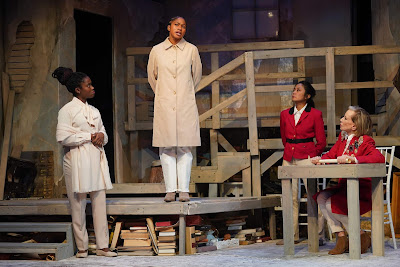Once again, I'm compiling a list of the top ten plays I saw in New York City that opened in 2023.
Last year, the musical
Paradise Square topped
my list, though critics were mixed in their reviews of the show, and it ended up closing at a financial loss.
Alas, I can't claim that this is the year theatre came back in New York, but a number of good shows did open in 2023, a couple of which are still running, so see them while you can!
10. The Smuggler - Irish Rep had an ambitious season this year, but the best thing I saw there was a very small show, Ronán Noone's one-man verse drama about a Massachusetts bar tender who ends up getting involved in human trafficking.
9. The School for Scandal - Hudson Classical Theatre Company continued its tradition this year of bringing solid productions of classical plays to the Soldiers' and Sailors' Monument in Riverside Park. This year's staging of Richard Brinsley Sheridan's
The School for Scandal brought together delightful acting with a creative costume design.
8. The Mind Mangler - This year the team that brought us
The Play That Goes Wrong opened a new show in their franchise featuring Henry Lewis as an inept mentalist. The show is funny, which I expected, but also successfully pulls off a couple of brilliant magic tricks, which I wasn't expecting. Best of all, though, it has a tremendous heart that is no illusion at all. (
Still playing!)
7. Crumbs from the Table of Joy - Keen Company's revival of Lynn Nottage's break-out play from 1995 was another unexpected delight, in part due to the performance of Shanel Bailey as Ernestine, a young woman in 1950s New York struggling to deal with changes both in the world and in her own family. Bailey definitely had a good year in 2023, as she appeared in another great revival on my list as well.
6. The Knight of the Burning Pestle - I directed this Jacobean classic when I was in college, so I knew I'd have to see a co-production by Red Bull and Fiasco Theater. Paco Tolson led the cast as a grocer's apprentice who becomes the titular Knight of the Burning Pestle. What made the piece a sheer joy, however, was the interaction of the ensemble, including Ben Steinfeld, Royer Bokus, and Teresa Avia Lim.
5. Here We Are - Stephen Sondheim's collaboration with David Ives finally made it to the stage this year. Even with flawed direction, the piece soars with a cast that includes Jeremy Shamos, Amber Gray, Bobby Cannavale, Rachel Bay Jones, Steven Pasquale, Micaela Diamond, and David Hyde Pierce. Whether or not you've seen any of the surrealist films of Luis Buñuel that inspired the piece, you should be able to appreciate the play's existential musings on modern life. Hurry to
see the show before it closes on January 21st.
4. Arms and the Man - Shanel Bailey came back to Theatre Row this fall to appear as Raina in Gingold Theatrical Group's magnificent production of Shaw's anti-war classic
Arms and the Man. Director David Staller brought together a wonderful cast that also included Keshav Moodliar, Ben Davis, Delphi Borich, Thomas Jay Ryan, Evan Zes, and Karen Ziemba. As someone who is a fan of toy theatres, I also loved the set designed by Lindsay G. Fuori to resemble a paper stage from the Victorian era. I'm looking forward to seeing what GTG does next in 2024!
3. Hamlet - The Public Theater chose Kenny Leon to direct the last production of Shakespeare in the Park before the Delacorte Theatre is shut down for renovations. Beowulf Boritt's set playfully echoed the one he previously designed for Leon's
Much Ado About Nothing. The biggest joy, though, was seeing famed Shakespearean actor John Douglas Thompson play the most engrossing Claudius I've ever seen. Ato Blankson-Wood was able to hold his own as young Prince Hamlet, and the cast also included Lorraine Toussaint as Gertrude, Daniel Pearce as Polonius, and Solea Pfeiffer as Ophelia.
2. The Great Gatsby - The immersive production of
The Great Gatsby was criminally underrated. The piece contained a couple of more traditional scenes, such as the tea Jay Gatsby prepared for Daisy, where the entire audience was assembled in one place. What was most interesting, though, was the way we were all divided into small groups to wander through side scenes, having interactions with various characters, sometimes with other audience members, and sometimes one-on-one. The live music was an added bonus. Sadly, the show closed in New York, but there's a chance it might come back, if not here, in another city.
1. Becomes a Woman - My top choice this year is likely to surprise a lot of people, but the Mint Theater Company performed an immense service in bringing Betty Smith's long forgotten play to the stage at last. Before Smith penned her 1943 novel
A Tree Grows in Brooklyn, she wrote
Becomes a Woman, but this was 1931, and no theatre wanted to touch a play with a feminist bent so far ahead of its time. In the Mint's long overdue production, Emma Pfitzer Price starred as Francie Nolan, a character whose name Smith later used as the heroine of her classic novel. Other strong performances were delivered by Jeb Brown, Peterson Townsend, Gina Daniels, Jason O'Connell, and Duane Boutté.
So that's my list! I'm looking forward to more great theatre in 2024.
















